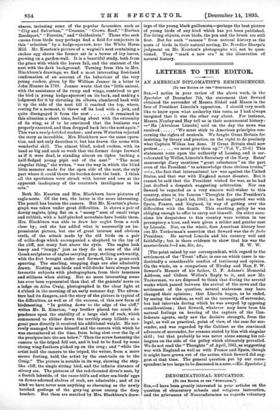LETTERS TO THE EDITOR.
AN AMERICAN DIPLOMATIST'S REMINISCENCES.
[ToTIM EDITOR OP THZ " SPECTATOR."] Sia,—I notice in your review of the above work, in the Spectator of December 7th, the statement that Seward obtained the surrender of Messrs. Slidell and Mason in the face of President Lincoln's opposition. I should very much like to know upon what authority this rests, as I had always imagined that it was the other way about. For instance, Messrs. Nicolay and Hay tell us in their monumental history :
— "He [Abraham Lincoln] said on the day the news was
received 'We must stick to American principles con- cerning the rights of neutrals. We fought Great Britain for insisting, by theory and practice, on the right to do precisely what Captain Wilkes has done. If Great Britain shall now
protest we must give them up." (Vol. V., 25-6.) This statement rests upon the authority of Lossing. and is cor- roborated by Welles, Lincoln's Secretary of the Navy. Bates' manuscript diary mentions "great reluctance " on the part even of the President " to acknowledge these obvious truths," — i.e., the fact that international law was against the United States, and that war with England meant disaster. But it cannot be said that the President wished for war, as he had just drafted a despatch suggesting arbitration. Nor can Seward be regarded as a very sincere well-wisher to this country, since in his famous Thoughts for the President's Consideration" (April 1st, 1561), he had suggested war with Spain, France, and England, by way of getting over the difficulties with the South. This startling policy he was obliging enough to offer to carry out himself. On other occa- sions his despatches to this country were written in too peremptory a tone, and were given a milder and gentler cast by Lincoln. Nor, on the whole, does American history bear out Mr. Tuckerman's. assertion that Seward was the de facto President. He served Lincoln and his country well and faithfully ; but is there evidence to show that his was the master-brain F—I am, Sir, 8:,c., H. W. W.
[The point raised by our correspondent, with regard to the settlement of the Trent ' affair, is one on which there is un- doubtedly a considerable conflict of testimony and opinion. On the whole, on a comparison of Nicolay and Hay, F. W. Seward's Memoir of his father, C. F. Adams's Memorial Address, and Gideon Welles's Reply to it, and now Mr. Tuckerman, we are disposed to think that during the several weeks which passed between the arrival of the news and the settlement of the question, several statesmen may have changed their opinions ; that Lincoln began, as he ended, by seeing the wisdom, as well as the necessity, of surrender, but had intervals during which he was swayed by opposing considerations ; that Seward, whatever may have been his natural feelings on hearing of the capture of the Con- federate agents, early saw the decisive strength, from the legal, as well as practical, point of view, of the case for sur- render, and was regarded by the Cabinet as the convinced advocate of surrender, for reasons stated by him with singular skill ; bat that probably he was never alone among his col- leagues on the side of the policy which ultimately prevailed. We do not read the " Thoughts " of April, 1861, as suggesting war with England as well as with France and Spain, though it might have grown out of the action which Seward did sug- gest at that time. The general question put by our corre- spondent is too large to be discussed in a note.—ED. Spectator.]










































 Previous page
Previous page